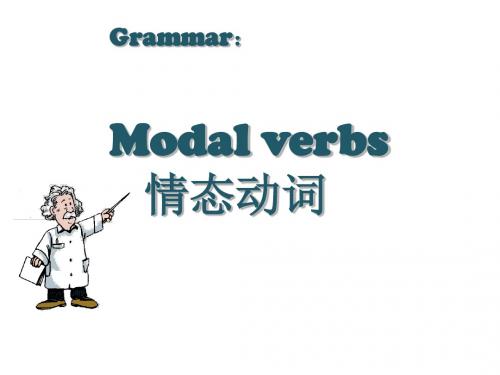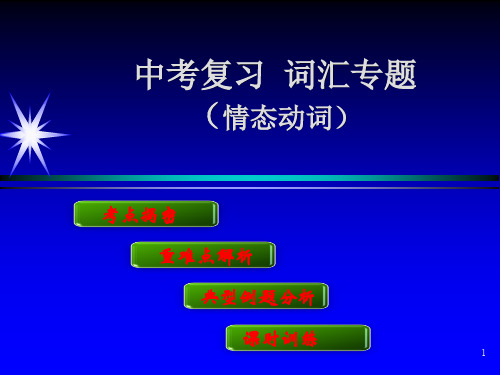初中英语语法专题辅导第九讲情态动词ppt课件
合集下载
情态动词讲解精ppt课件

例句
will/would
详细描述:will 表示现在的意愿或 预测,would 表示过去的或虚拟 的意愿或预测。
1. I will help you with your project.(我会帮助你完成你的项 目。)
总结词:表示意愿或预测
例句
2. They would have gone to the party if they had known about it earlier.(如果他们早点 知道,他们就会去参加聚会。)
表示意愿
情态动词+动词原形,如 would like to go,表示 某人想要去。
形式变化
基本形式
情态动词的基本形式包括 现在时、过去时和将来时 。
过去式
情态动词的过去式通常是 在基本形式后面加-d或ed,如could have done 、should have done等。
将来时
情态动词的将来时通常是 在基本形式后面加-will或shall,如will be able to 、shall have to等。
may与might的区别与联系
总结词
may表示现在的许可或可能性;might表示过去的可能性或许可。
详细描述
may用于肯定句中,表示许可或可能性,例如“You may use this room.”(你可以使用这个房间。 )“The book may be in the library.”(这本书可能在图书馆里。)might表示过去的可能性,常 用于过去时态的句子中,例如“He might come tomorrow.”(他明天可能来。)
未必、很难说
She might not agree with us.
表示虚拟语气
will/would
详细描述:will 表示现在的意愿或 预测,would 表示过去的或虚拟 的意愿或预测。
1. I will help you with your project.(我会帮助你完成你的项 目。)
总结词:表示意愿或预测
例句
2. They would have gone to the party if they had known about it earlier.(如果他们早点 知道,他们就会去参加聚会。)
表示意愿
情态动词+动词原形,如 would like to go,表示 某人想要去。
形式变化
基本形式
情态动词的基本形式包括 现在时、过去时和将来时 。
过去式
情态动词的过去式通常是 在基本形式后面加-d或ed,如could have done 、should have done等。
将来时
情态动词的将来时通常是 在基本形式后面加-will或shall,如will be able to 、shall have to等。
may与might的区别与联系
总结词
may表示现在的许可或可能性;might表示过去的可能性或许可。
详细描述
may用于肯定句中,表示许可或可能性,例如“You may use this room.”(你可以使用这个房间。 )“The book may be in the library.”(这本书可能在图书馆里。)might表示过去的可能性,常 用于过去时态的句子中,例如“He might come tomorrow.”(他明天可能来。)
未必、很难说
She might not agree with us.
表示虚拟语气
情态动词语法 ppt课件

ppt课件 3
(3) 表示客观可能性即推测用法,多用于否定句和疑问句中, could只表示可能性比can小,不表时态。(否定推测) —Who is that man? Can it be your uncle? —No, it can’t be him. (4) can 也用在肯定陈述句中,表示理论上的可能性,意为“有 时可能会” Anybody can make mistakes. Even top students can make mistakes in the exam. 即使优秀学生在考试中也可能会出错。
ppt课件
14
(3)shall用在主语是第三人称的陈述句中,表示条约,规章,法令 等文件中表示义务或规定, 常用于官方文件中,表明具有法律效 力。(而should表示应该,义务)。 All payments shall be paid by the end of the month. 本月底所有款项必须付清。 No person shall carry a mobil phone into the examination room during the College Extrance Examination.
ppt课件 7
(2)may和might的用法
1. may和might表示请求、许可。 表示征求同意和允许,表征求同意时,might比may的语气更委 婉一些,否定回答时要用mustn’t表示“不可以”、“禁止”、“阻止” 之意。 may表示“允许”,否定形式为mustn't/can't,表示“禁止、不允 许、不可以”如: You may keep the book for a week. 这本书你可以保留一星期。 — Might I use your pen? — Yes, you may/can. —No, you mustn't/can't.
(3) 表示客观可能性即推测用法,多用于否定句和疑问句中, could只表示可能性比can小,不表时态。(否定推测) —Who is that man? Can it be your uncle? —No, it can’t be him. (4) can 也用在肯定陈述句中,表示理论上的可能性,意为“有 时可能会” Anybody can make mistakes. Even top students can make mistakes in the exam. 即使优秀学生在考试中也可能会出错。
ppt课件
14
(3)shall用在主语是第三人称的陈述句中,表示条约,规章,法令 等文件中表示义务或规定, 常用于官方文件中,表明具有法律效 力。(而should表示应该,义务)。 All payments shall be paid by the end of the month. 本月底所有款项必须付清。 No person shall carry a mobil phone into the examination room during the College Extrance Examination.
ppt课件 7
(2)may和might的用法
1. may和might表示请求、许可。 表示征求同意和允许,表征求同意时,might比may的语气更委 婉一些,否定回答时要用mustn’t表示“不可以”、“禁止”、“阻止” 之意。 may表示“允许”,否定形式为mustn't/can't,表示“禁止、不允 许、不可以”如: You may keep the book for a week. 这本书你可以保留一星期。 — Might I use your pen? — Yes, you may/can. —No, you mustn't/can't.
情态动词语法讲解PPT课件

2表示“许可”和“不许”
a)请求对方“许可”可用can, could, may, might.
may/might较正式,could/might较委婉
表示给予“许可”通常用can/may,而不用 could/might
Could I use your phone? Yes, of course you can. Might I trouble you for a light? You may indeed.
表示将来的“必须”,常用have to的一定 形式(will/shall have to) 比较:
•We must do it again.(表示现在)
•We’ll have to do it again.(表示将来)
•表示过去的“必须”,常用had to
•I had to leave at six yesterday.
•They must be home by now.(他们现在一定到家了)
will/would表示“推测”可有三种情况
1)对特定事态的推测
A: Who’s that man over there? B: That will be George, no doubt. C: That would be George, I except.
• Can they have missed the bus?
• Yes, they may have.
may not重音落在助动词上,表示 “不可能”,重音落在否定词上,表 示“不许可” , 比较:
•He may not go tomorrow.
•He may not go tomorrow.
•所以在书面语中,表示“不可能” 常用can’t
情态动词-完整版PPT课件

情态动词 modal verbs
1.情态动词的用法特点
1)情态动词 除 ought 和 have 外,后面只能 接不带to 的不定式。 2)情态动词没有人称,数的变化,即情态动 词第三人称单数不加-s。 3)情态动词没有非谓语形式,即没有不定式, 分词等形式。
can could may might shall should must will would ought to
have to dare need used to
表示推测
情态动词
不表示推测
2.表示推测——情态动词的重要用法.
情态动词
对将来
对现在
对过去
m肯ust/定sho的uld 推测
+ V. + V. + have done
常见must be + be doi定的推测 can’t, couldn’t
疑问的推测
can, could
+ V.
+ V.
+ have done
+ be doing
可以用not表示“可能不”
+V.
+ V.
+ have done
+ be doing
+ V.
+ V.
+ have done
+ be doing
不同的“肯定”程度可按下列层次排列: He is at home. (事实) He must be at home.(非常肯定的推断) He ought to be at home.(很可能) He could be at home.(很可能) He may be at home.(仅仅可能而已) He might be at home.(或许, 非常不确定) He might not be at home.(也许不在家) He may not be at home. (比might可能) He couldn’t be at home.(很可能不在家) He can’t be at home.(一定不在家)
1.情态动词的用法特点
1)情态动词 除 ought 和 have 外,后面只能 接不带to 的不定式。 2)情态动词没有人称,数的变化,即情态动 词第三人称单数不加-s。 3)情态动词没有非谓语形式,即没有不定式, 分词等形式。
can could may might shall should must will would ought to
have to dare need used to
表示推测
情态动词
不表示推测
2.表示推测——情态动词的重要用法.
情态动词
对将来
对现在
对过去
m肯ust/定sho的uld 推测
+ V. + V. + have done
常见must be + be doi定的推测 can’t, couldn’t
疑问的推测
can, could
+ V.
+ V.
+ have done
+ be doing
可以用not表示“可能不”
+V.
+ V.
+ have done
+ be doing
+ V.
+ V.
+ have done
+ be doing
不同的“肯定”程度可按下列层次排列: He is at home. (事实) He must be at home.(非常肯定的推断) He ought to be at home.(很可能) He could be at home.(很可能) He may be at home.(仅仅可能而已) He might be at home.(或许, 非常不确定) He might not be at home.(也许不在家) He may not be at home. (比might可能) He couldn’t be at home.(很可能不在家) He can’t be at home.(一定不在家)
情态动词详解ppt课件

She could / was able to sing like an angel
when she was a child.
2021精选ppt
8
3. 表示过去的能力 (1)could , was/ were able to 表示过去 一般的能力,即不表示做与未做某事。
She could / was able to sing like an angel
He should be around sixty years old. 他可
能60岁上下。
It’s nearly seven o’clock. Jack should be here
at any moment. (表示确定或期待)
2021精选ppt
15
4)should 表示推测时,表示确定或可能有 的未来或期望,即合乎理想的情况或结果。
He may not have finished the work.
He might have caught a cold.
2021精选ppt
20
5. Might have done
表示“本来可能……”,但实际上没有发生 的事。
另外,还可以表示“本应该或可以做某 事,”,含有轻微的责备语气。
You should not have swum in that sea.
that.
2021精选ppt
22
7. Needn’t have done
表示“做了本来不必去做的事情”, 注意:didn’t need to do 表示“没有必 要做而实际也免于做某事”。
You needn’t have taken a taxi here, for it was very near to my house.
when she was a child.
2021精选ppt
8
3. 表示过去的能力 (1)could , was/ were able to 表示过去 一般的能力,即不表示做与未做某事。
She could / was able to sing like an angel
He should be around sixty years old. 他可
能60岁上下。
It’s nearly seven o’clock. Jack should be here
at any moment. (表示确定或期待)
2021精选ppt
15
4)should 表示推测时,表示确定或可能有 的未来或期望,即合乎理想的情况或结果。
He may not have finished the work.
He might have caught a cold.
2021精选ppt
20
5. Might have done
表示“本来可能……”,但实际上没有发生 的事。
另外,还可以表示“本应该或可以做某 事,”,含有轻微的责备语气。
You should not have swum in that sea.
that.
2021精选ppt
22
7. Needn’t have done
表示“做了本来不必去做的事情”, 注意:didn’t need to do 表示“没有必 要做而实际也免于做某事”。
You needn’t have taken a taxi here, for it was very near to my house.
情态动词全部ppt课件

A.must
B.would
C.should
D.might
19
• 翻译 • ----我能在这个房间抽烟吗? .
---- 可以。 ---- 不行,… ----Might/ May I smoke in this room?
---- Yes, you can.
---- No, you mustn’t
20
rule.
(威胁)
26
Shall 决心、承诺、警告、命令 you \he\she\they shall…..(二三人称陈述)
When the chairman turns up, nobody shall say a word. 命令 Students shall remain in their seats until the papers have been
28
5. should
1. should表示义务、职责、劝告,意 为 “应该”。
eg: You should keep your promise. Students should respect teachers.
29
2)表示说话人_惊_讶______等特殊情感。
It’s surprising that Mary should not know Lei Feng.
3.must, need没有时态,但有些情态动词如can、 may,will,have to有一般式和过去式的变化。
4. 情态动词不能单独做谓语,必须和实义动词原形 一起构成谓语。
3
情态动词的“时态”形式并不是时间区 别的 主要标志, 不少情况下, 情态动词的 现在式 形式和过去式形式都可用来表 示现在时 间、过去时间和将来时间。
七年级-情态动词ppt

can't have done 的语气比 couldn't have done 要强一些
以could或would提问时,不能再以 could或would作答,而应该用can或will。 如: —Could I borrow your dictionary? —Yes, of course you can.
2.表示“必须”这个意思时,must 和 have to 稍有区别。must着重说明主观 看法,have to 强调客观需要。另外, have to 能用于更多时态。
I don’t like this TV set. We must buy a new one. There was no more bus. They had to walk home.
只作情态动词的 can / could, may / might, ought to, must
可情态可实义的 need, dare 可情态可助动词的 shall / should, will /
would 相当于情态动词的 have to, used to
can 和could:
1) can的主要用法是: A. 表示体力或脑力的能力:
I’d like to…
would表示过去的习惯,后接动词原形,意 为“总是,总会” e.g. He would sit near the fire for hours on winter evenings. e.g. When I was a child, I would go swimming with other children in summer.
dropped it can’t/couldn’t have done: 用于否定句时表否定推断,推
以could或would提问时,不能再以 could或would作答,而应该用can或will。 如: —Could I borrow your dictionary? —Yes, of course you can.
2.表示“必须”这个意思时,must 和 have to 稍有区别。must着重说明主观 看法,have to 强调客观需要。另外, have to 能用于更多时态。
I don’t like this TV set. We must buy a new one. There was no more bus. They had to walk home.
只作情态动词的 can / could, may / might, ought to, must
可情态可实义的 need, dare 可情态可助动词的 shall / should, will /
would 相当于情态动词的 have to, used to
can 和could:
1) can的主要用法是: A. 表示体力或脑力的能力:
I’d like to…
would表示过去的习惯,后接动词原形,意 为“总是,总会” e.g. He would sit near the fire for hours on winter evenings. e.g. When I was a child, I would go swimming with other children in summer.
dropped it can’t/couldn’t have done: 用于否定句时表否定推断,推
初中英语情态动词ppt课件

If that is the case, we may as well try. 典型例题
Peter ___come with us tonight, but he isn‘t very sure yet.
A. must B. may C. can D. will 答案B. 表可能性只能用may. 此句意可从后半句推出。15
5
➢ 考点揭密
5 shall, will用来征求对方意见,shall用于第一人称,will用 于第二人称,用来表示意愿;shall用于第二、第三人称, will用于第一人称。
6 would, should为will,shall 的过去式,would用于现在时 ,表示委婉提出请求、建议或看法,如Would you please not do it again? should还有“应该”的意思,但语气比 must 弱。
比较: He must be staying there. 他现在肯定呆在那里。 He must stay there. 他必须呆在那。
18
➢ 重难点解析
6 must表示推测 must 表示对已发生的事情的推测时,must 要接完成式。 I didn’t hear the phone. I must have been asleep. 我刚才没有听到电话,我想必是睡着了。
1 can can 可表示能力、允许、可能性、怀疑猜测,意为“能, 会,可以”;can't意为“不会,不能,不可以”,还有 “不可能”之意。could为can的过去式,用法与can类似 ,常用于过去时中;could还可用于现在时中表示委婉客 气,相当于can;could也可表示惊讶怀疑,不相信,如: He couldn't be a thief.
Peter ___come with us tonight, but he isn‘t very sure yet.
A. must B. may C. can D. will 答案B. 表可能性只能用may. 此句意可从后半句推出。15
5
➢ 考点揭密
5 shall, will用来征求对方意见,shall用于第一人称,will用 于第二人称,用来表示意愿;shall用于第二、第三人称, will用于第一人称。
6 would, should为will,shall 的过去式,would用于现在时 ,表示委婉提出请求、建议或看法,如Would you please not do it again? should还有“应该”的意思,但语气比 must 弱。
比较: He must be staying there. 他现在肯定呆在那里。 He must stay there. 他必须呆在那。
18
➢ 重难点解析
6 must表示推测 must 表示对已发生的事情的推测时,must 要接完成式。 I didn’t hear the phone. I must have been asleep. 我刚才没有听到电话,我想必是睡着了。
1 can can 可表示能力、允许、可能性、怀疑猜测,意为“能, 会,可以”;can't意为“不会,不能,不可以”,还有 “不可能”之意。could为can的过去式,用法与can类似 ,常用于过去时中;could还可用于现在时中表示委婉客 气,相当于can;could也可表示惊讶怀疑,不相信,如: He couldn't be a thief.
- 1、下载文档前请自行甄别文档内容的完整性,平台不提供额外的编辑、内容补充、找答案等附加服务。
- 2、"仅部分预览"的文档,不可在线预览部分如存在完整性等问题,可反馈申请退款(可完整预览的文档不适用该条件!)。
- 3、如文档侵犯您的权益,请联系客服反馈,我们会尽快为您处理(人工客服工作时间:9:00-18:30)。
三、must的用法
1
必须,应该 You must finish your task before
playing gam”
He must be at home now.
一般疑问句肯 定回答用must, 否定回答则用
needn’t或者
don’t have to.
1. If you want to cross a street, you must wait for the green light. You mustn’t cross in front of the traffic.
情态动词,顾名思义是用来表达感情和态度的 动词。
表明说话人的立场和口气,以及说话想达到的 目的
常用的情态动词有:
can (could), may (might), must, have to, need,
ought to, shall , should
表能力 表推测 表请求、允许
1. Some of us can use the computer now, but we couldn’t ten years ago.
1) 可以,表示许可,相当于can. (注意问句中的回答)
2) 可能,或许,表示推测 may be 可能
(2010年福州)
-----Dad, must I do my homework now? -----No, you___play games with your friends
for a little while.
情态动词
and find out
If you want to cross a street, you must wait for the green light. You mustn’t cross in front of the traffic. If the light is yellow, you should wait. If you are not careful, a car may hit you. If you are in the UK, you have to drive on the left.
(2010年北京) ------__you turn down your radio, please?
------Yes, I can.
A. May B. Need C. Must D. Can (2009年济南) -----Who’s that girl swimming in the pool? Is it Lucy? -----It __be Lucy. She is sleeping in her bedroom now. A. may B. can’t C. must D. should
(2012年济南) ----- Lisa, _____ you speak French? ----- Yes, but only a little.
A. need B. must C. may D. can
2013济南 ---_____I help you, sir?
---Yes, I want a T-shirt. A Can B Should C Must D Would
1. If you are in the UK, you have to drive on the left.
2. The animals we eat have to spend their lives living in tiny spaces.
have to 不得不
11.. I hhaavveetotobbeeatawt worokrkatantinneinoe’colo’clkoecvkeeryvedrayy.day.
1.表推测 2.表请求、允许
1. ------MMaayyI IwwatacthchTVTVaftaefrtesur pspueprp?er?
------YYees,sy,oyuomu amy.ay. ------NNNooo,, ,yYooYuuoummmauysatnnyo’tnt.o/ tca/ nc’at.n/’tY. o/uY’dobue’dttebrenttoetr. not. 2. If yoNuoa,reyonuotmcuarsetfnu’tl,. a car may hit you.
have to + 动词原形
A. would B. needn’t C. may D. should
(2009年广州) — ___ I take some photos in the hall? —No, you___ . A. Can; needn't B. Must ; mustn't C. Could; won't D. May; mustn't
don’t have to. 3) 一定,表示肯定的猜测。 (否定猜测用can’t)
2013泰安 28.—May I smoke here?
--No, you . This is no-smoking room. A. needn’t B. mustn’t C. couldn’t D. wouldn’t
2. Can/Could I borrow these books? 3. The story can not be true.
1)能,会:表示能力,相当于be able to (be able to 适用于任何时态)。 2)可以,表示许可,(may较正式,could较婉转) 3)可能,表示否定推测,can’t be 不可能
2. --- Must I be home before 8 o’clock? --- Yes, you must. --- No, you needn’t / don’t have to.
3. There must be something wrong with my computer.
1)must: 必须;mustn’t: 不准,禁止 2)回答带有must的问句时,否定式常用needn’t 或
